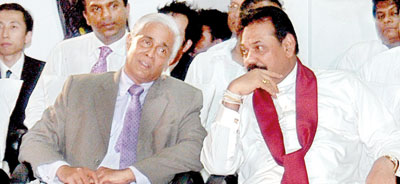Sunday Times 2
Helping Hambantota case: Sri Lanka, I weep for thee
The destiny of our country is mainly in the hands of two ex-officio persons. They are the all-powerful Executive President of the country, and the Chief Justice. The entry of the Chief Justice to the portals of justice is heralded with such pomp and pageant to trumpet the awesome course of the law that he has to pronounce.
The Helping Hambantota episode and its ramifications point to the abysmal direction the country is generally heading. Much has been written about this episode. I will only review relevant facts to make some pertinent points.

President Rajapaksa and ex-CJ Sarath N. Silva: Once close buddies
Fundamental Rights Application
First there was the allegation in 2005 of misappropriation of public funds by Prime Minister Mahinda Rajapaksa. Specific allegation was that tsunami funds were being siphoned off to the Helping Hambantota account. Preliminary inquiries revealed prima facie evidence of misappropriation of Rs. 83,000,000 and a B Report was filed in the Fort Magistrate’s Court seeking assistance for further investigations into the allegation. Court assistance was granted.
On an FR application made by Prime Minister Rajapaksa, the then CJ, Sarath N Silva, quashed the investigations holding that the allegation was false and politically motivated. Going further the CJ imposed compensatory fines on the complainant and the police officers who were conducting investigations.
Imposition of fines in FR cases before Supreme Courts calls for examination of the law in this regard. In these cases the procedure adopted is an affidavit procedure, which considers the evidence submitted only by way of an affidavit. In imposing penalties, there was no due processing of the evidence as needs to be done in judicial adjudications, with cross examination of evidence and witnesses. In these FR cases no charges were held out against the police officers and no opportunity was given to the officers to plead before such penalties were imposed. The police officers’ rights have been violated in the process, and thereby imposition of compensatory fines amounts to extortion as pointed out by Rtd. SSP Tassie Seneviratne in an earlier article published in the Sunday Times.
What is more shocking is the recent confession made by Ex-CJ Silva stating that his judgment in the Helping Hambantota case was wrong. Elaborating on this at an interview with BBC- Sinhala, he stated that he gave his judgment to enable Prime Minister Rajapaksa to become the Executive President on a presumption that he was innocent of the allegation and that now in the light of subsequent corrupt actions of President Rajapaksa and looking back in that light on the Helping Hambantota case, he believes that his judgment was wrong.
Ex-CJ Silva seems to think that some ongoing divine authority has been bestowed on him to appoint the Executive President and remove him at his discretion on his presumptive thinking, even after he has ceased to be the CJ.
It is also noteworthy that no relief has been granted to the innocent police officers on whom compensatory fines were imposed by the wrong judgment.
Stolen property
Stolen property is defined in Section 393 of the Penal Code as “Property, the possession whereof has been transferred by theft, or by extortion, or by robbery or by forgery, or by cheating, and property which has been criminally misappropriated or in respect of which criminal breach of trust has been committed, is designated as “stolen property” . …But if such property subsequently comes into the possession of a person legally entitled to the possession thereof, it then ceases to be stolen property.” Hence the fines imposed on the innocent police officers amount to stolen property.
Receiving or retaining stolen property dishonestly is an offence punishable under Section 394 of the Penal Code. Even if President Rajapaksa did not know that it was stolen property when he received it, he should now take note that the monies have been extorted from the police officers on a wrong order of the CJ and do what is lawful and is the right thing to do — that is, return it to the rightful owners with compensation.
Such being the types of persons in whose hands rested the Rule of Law in this country, one wonders whither would go Sri Lanka’s destiny now with such appointments being made under the 18th Amendment.
(The writer is a Rtd Deputy Inspector General of Police)

